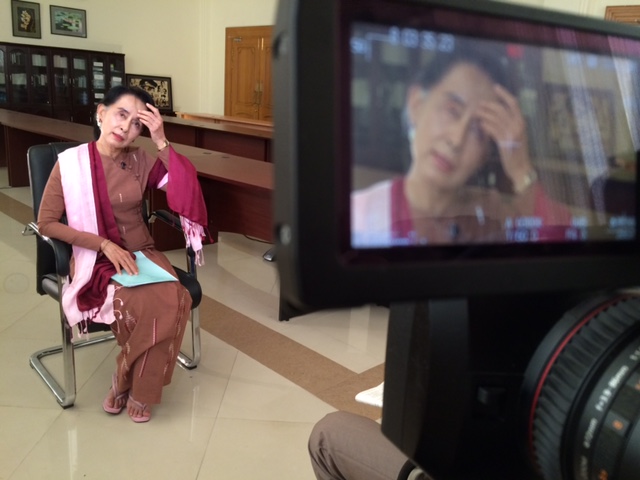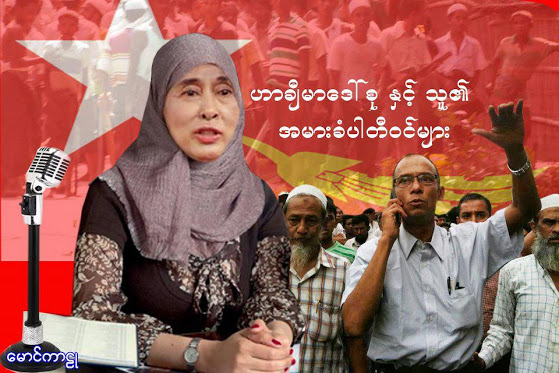Aung San Suu Kyi: a painful metamorphosis
For so long Burma’s chief dissident, now the leader of a political party, Aung San Suu Kyi strongly denies any complacency against persecution.
The transition from leading dissident to the leader of a political party, ensconced in the bruising world of Burmese politics, was never going to be an easy one for Aung San Suu Kyi – or for that matter, the rest of us.
And so it has proven, with the diminutive 69 year-old preparing to fight crucial national elections in November.
We all know the back-story. Her father, Aung San, is considered to be the founder of modern Burma, but she lost him at the age of 2 to an assassin’s bullet.
She spent time in India and the UK, marrying an English academic before returning to her homeland to compete in national elections in 1990.
When her National League of Democracy party (NLD) won those elections the military men swiftly cancelled the results, placing her under house arrest for good measure. She was released, amid promises of political reform, in 2010.
Fast forward five years, and the Nobel Laureate, feted around the world for her courage and determination, is embroiled in the cut-throat world of domestic politics.
In an exclusive interview with Channel 4 News, I asked whether the upcoming election marked a crucial moment in Burmese history.
“It is very important,” she replied. “Let’s hope, to begin with, that we get to the elections without any problems and the path to the elections is smooth… we have to hope for that because it is very important.”
Ms Suu Kyi was clearly worried about attempts to thwart the democratic process.
“I don’t know whether the elections will be free and fair,” she told me, “because we had found when we examined the voter lists in 10 townships that there were terrible, terrible mistakes – up to about 80 per cent of the information was incorrect.
“These townships are all in Rangoon and what would it be like in the areas far away from Rangoon? The border areas for example. One has to wonder, can the voter lists been prepared correctly and satisfactorily in the time that is left to us before the election?”
ASSK for president?
The NLD leader is also concerned, it is believed, about how members of Burma’s oversized military will vote: will they be permitted to cast their votes outside barracks for example?
Nonetheless, she knows there is little chance she will serve as president, at least in the short- to medium-term.
That’s because the generals who come up with the current constitution have reserved the right of the military to veto proposed changes.
They also came up with section “59 f”, just to make sure their long-time foe could not sit in the president’s office.
The provision excludes those with offspring who owe their “allegiance to a foreign power.” Ms Suu Kyi’s two children hold British citizenship.
“The document was designed to be difficult to change,” said the Nobel Laureate. “Some experts consider it [the] most rigid constitution in the world.”
The government convened a meeting in April to discuss constitutional reform, but Ms Suu Kyi says it did not achieve a great deal.
“We really didn’t get around to talking about much about constitutional change. There were discussions about how far the tables were from one another and so on and so forth.
“But I don’t think you could say that meeting constituted a substantial discussion on constitutional change.”
Plight of the Rohingya
Still, there are a lot of other issues that demand the attention of Burmese politicians, like the dramatic rise of religious nationalism is this Buddhist-majority nation.
The relaxation of government restrictions on the media has fuelled an outpouring of hate speech – and violence – directed largely at a minority Muslim group called the Rohingya.
Critics say Aung San Suu Kyi and other political leaders here should have done more to confront the extremists and the xenophobic messages – but the NLD chair disagrees.
“I don’t know what you mean by challenging and confronting, it’s a very, very complex problem,” she says.
“And certainly a lot of extremists have been allowed to go their extremist way without the government taking action, but this is why the NLD has repeatedly said that the rule of the law is so important.”
Ms Suu Kyi repeatedly returns to the rule of law – in fact it is something of mantra. She believes it is the “only way” to “promote peace and harmony within society”.
But as a tool to protect minorities like the Rohingya from extremists, it seems grossly insufficient.
That is because the Rohingya – of whom there are thought to be 1.2m in Burma – are denied citizenship and as such, have few, if any, rights to enforce. This unfortunate reality was borne out in Rakhine State, where most of them live.
Following an outbreak of communal violence in 2012, some 140,000 Rohingya were burnt out of their homes.
‘I have condemned persecution’
Far from trying to stop the violence, human rights campaigners say some local officials were directly involved. More than 100,000 Rohingya are now held in squalid detention camps located outside the state capital Sittwe.
The situation resembles something of a legal vacuum, and Ms Suu Kyi’s many critics say she has failed to step in and provide the necessary moral leadership. However, it is claim that she vehemently denies.
“I have condemned persecution, I have always condemned [the] violation of human rights, by the government of ordinary people, by individuals against one another, I have always condemned that – but perhaps I don’t use the kind of pyrotechnic language that people would like.”
Ms Suu Kyi told me that she too was a victim of the religious extremists who were actively trying to make her look “pro-Muslim” and “anti-Buddhist”.
Above: one of the photos posted online in Burma portraying Aung San Suu Kyi as a “Muslim lover”
“About a month or so ago, a very, very simple thing that happened at a meeting,” she told me.
“There was a Catholic priest, a Muslim mufti, there were some Buddhist monks as well, and of course I greeted [them]. But they took a photograph, cut out the monks and put the photograph on the internet and said I was making obeisance to the Muslims.
“And what was worse was, when I went to the Mon state recently, they distributed this photograph to make the Mons think that I was pro-Muslim or anti-Buddhist.
“It was just a political tool and this is very worrying because this is the racial and religious issue for political ends, and this could lead to a lot of unrest and trouble which would be very, very difficult to bring to an end.”
Being seen as “pro-Muslim” in Burma is an electoral liability – something the NLD leader clearly grasps.
Above: one of the photos of Aung San Suu Kyi bowing to Muslim muftis with monks left out of shot
There is little or no sympathy for the Rohingya in Burma, a group considered by the majority here to be illegal immigrants from Bangladesh.
Perhaps that is why Ms Suu Kyi’s views on the problems faced by Rohingya in Rakhine State seem poorly developed.
Is it all she expected?
When I asked her whether she thought the internment camps should be shut down, she said: “You can’t shut down internment camps without making alternative arrangements – people say shut down the camps, but where are all those people going to go to?”
On the vexed question of citizenship, she said those Rohingya “who are entitled to citizenship should be given citizenship – even the Rakhine Buddhists agree with that”.
Do Rakhine Buddhists really agree – and what criteria would have to be met?
After five years at the heart of Burmese politics – of scrutinising legislation, proposing bills, running a party and fending off a growing band of critics – I asked if it had all worked out the way she expected it to. Here is what she had to say:
“I don’t know quite what I expected then now that I think back, but certainly things have worked out better in some ways and not so well in others.
“With regard to hopes for genuine negotiations with the government, there has been disappointment, but with the amount of work we managed to get through in the legislature, that has been a good surprise, a pleasant surprise. We have been able to do a lot more than we thought.”
Follow @c4sparks on Twitter


